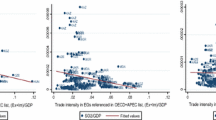Abstract
Two central topics in recent rounds of international trade negotiations have been environmental concerns and services trade. While each is undoubtedly important, they are unrelated. In this paper, I show that the services-environment link is small, for two reasons. First, services account for only a small fraction of overall pollution. For none of five major air pollutants does the service sector account for even 4% of total emissions; for three of the five services account for less than 1%. Second, those service industries that do pollute are the least likely to be traded internationally. Those services for which the United States collects and publishes international trade data—presumably those services that are traded internationally—are less polluting than services for which trade data do not exist—presumably because the services are not traded. Even if we limit attention to the services that are traded across borders, the service industries most intensively traded are the ones that pollute the least. The bottom line is simple. International services trade bears little relation to the environment, because services in general contribute relatively little to overall pollution, and those industries that are traded internationally are among the least polluting.
Similar content being viewed by others
Notes
Correspondence with Roy Huntley, U.S. EPA.
One could argue that opportunities for sales through affiliates, via foreign direct investment, increase economic activity and therefore pollution. That is a secondary scale effect that I ignore by necessity for sales through affiliates as well as for cross-border trade.
Reuters. February 11, 2008. “Airline Outsourcing Endangering Passengers, National Security, Say Aviation Mechanics.”
See, for example, Miller and Blair (1985).
The BEA data includes cross-border expenditures on tour agencies and reservations, but not the direct expenditures by foreign tourists on U.S. services, or services purchased by U.S. tourists abroad.
Abbreviations
- BEA:
-
Bureau of economic analysis
- CO:
-
Carbon monoxide
- EPA:
-
Environmental Protection Agency
- GATS:
-
General Agreement on Trade in Services
- NAAEC:
-
North American Agreement on Environmental Cooperation
- NAICS:
-
North American Industry Classification System
- NAFTA:
-
North American Free Trade Agreement
- NEI:
-
National Emissions Inventory
- NOx :
-
Nitrogen oxides
- PM10:
-
Particulate matter smaller than 10 microns
- SIC:
-
Standard industrial classification
- SO2 :
-
Sulfur dioxide
- TEAM:
-
Trade and Environmental Assessment Model
- VOCs:
-
Volatile organic compounds
References
Koncz, J., & Flatness, A. (2007). U.S. International Services: Cross-border trade in 2006 and sales through affiliates in 2005. Survey of Current Business (October).
Miller, R. E., & Blair, P. D. (1985). Input-output analysis: Foundations and extensions. Englewood Cliffs: Prentice-Hall.
U.S. Environmental Protection Agency. (2004). Trade and environmental assessment model: Model description. Prepared for U.S. EPA, National Center for Environmental Economics, by Abt Associates, Inc., Cambridge, MA.
Whichard, O. G., & Borga, M. (2002). Selected issues in the measurement of U.S. International Services. Survey of Current Business (June).
Acknowledgments
I am grateful to the National Center for Environmental Economics (NCEE) and to Resources for the Future for hosting me during parts of this research, to Mun Ho, Carl Pasurka, Jared Creason, Irene Henriques, and Chantal Line Carpentier for helpful conversations and suggestions. Roy Huntley and Rhonda Thompson at the EPA provided invaluable help interpreting the National Emissions Inventory.
Author information
Authors and Affiliations
Corresponding author
Rights and permissions
About this article
Cite this article
Levinson, A. Pollution and international trade in services. Int Environ Agreements 10, 93–105 (2010). https://doi.org/10.1007/s10784-010-9115-9
Accepted:
Published:
Issue Date:
DOI: https://doi.org/10.1007/s10784-010-9115-9




